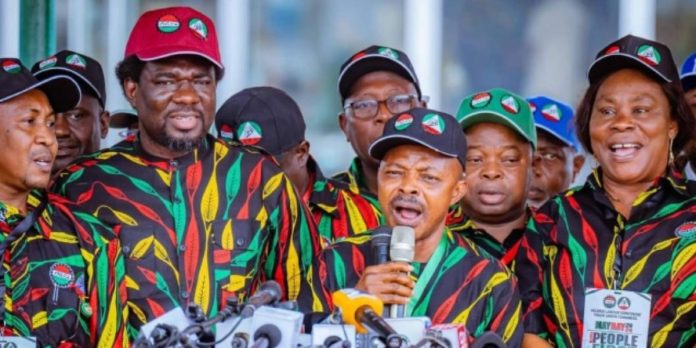Organized Labour has accused Bukar Goni Aji, Chairman of the Tripartite Committee, of being out of touch with the severe hardships faced by workers and other Nigerians. This accusation follows Aji’s recent appeal to Labour to reconsider their minimum wage demand in light of the country’s economic situation.
Aji highlighted several government initiatives aimed at easing economic pressures, including a ₦35,000 wage award for federal workers, a ₦100 billion fund for gas-fueled buses, a ₦125 billion conditional grant, and ₦25,000 monthly support for 15 million households over three months. He argued these measures justified accepting the government’s ₦62,000 minimum wage offer instead of Labour’s ₦250,000 demand.
However, Organized Labour, represented in the Tripartite Committee, stood firm on their demand, citing a nationwide survey that underscored the harsh economic realities for average Nigerian families. A Labour negotiator urged Aji to press the government for a more realistic proposal that reflects the true cost of living.
Labour’s representative explained that the escalating cost of living, driven by rising petrol prices, higher electricity tariffs, and naira devaluation, had made basic needs unaffordable for workers. He emphasized that their ₦250,000 demand was based on data showing the current market prices of essential goods and services.
“We understand the chairman’s call for Labour to consider the economic situation,”
the representative said.
READ ALSO: https://thecrux.com.ng/serap-to-tinubu-proposed-minimum-wage-recommendations-are-realistic/
“However, the request shows a limited understanding of the hardships faced by Nigerian workers. Our survey clearly outlines the economic challenges, including the high costs of basic commodities and the eroded purchasing power of the average worker.”
Labour provided examples of current prices: ₦80,000 for a 50kg bag of rice, ₦7,000 for a tuber of yam, ₦3,500 for a half-paint bucket of garri, ₦2,000 for a loaf of bread, ₦6,000 per kilogram of meat, ₦2,000 for 75 litres of oil, ₦50,000 monthly for electricity, and ₦3,000 to ₦4,000 daily for transportation.
The representative criticized the government’s lack of transparency and their offer’s disconnection from market realities.
“When we asked for a breakdown of the government’s offer, there was no response,”
he noted.
“This suggests that the government knows its offer does not meet workers’ basic needs, undermining its credibility.”
He urged the chairman to redirect his advice to the government, calling for a realistic and fair approach to the negotiations.
“The government’s offer should reflect the actual economic conditions and the cost of living faced by workers,”
he insisted.
“Our demand for ₦250,000 is not arbitrary but accurately represents current economic realities.”
Labour also called on government leaders to make sacrifices, reducing their luxury expenses to benefit Nigerian workers and citizens.
“Good leaders sacrifice for the citizenry,”
the representative said.
“They should cut down on security votes, luxury yachts, convoys, private jets, and other comforts so that Nigerian workers and people can benefit.”
In conclusion, Labour reiterated their stance, driven by an understanding of the economic hardships faced by workers. They urged the Tripartite Committee Chairman to advocate for fairness and transparency, ensuring the nation’s resources are equitably distributed for national development.










